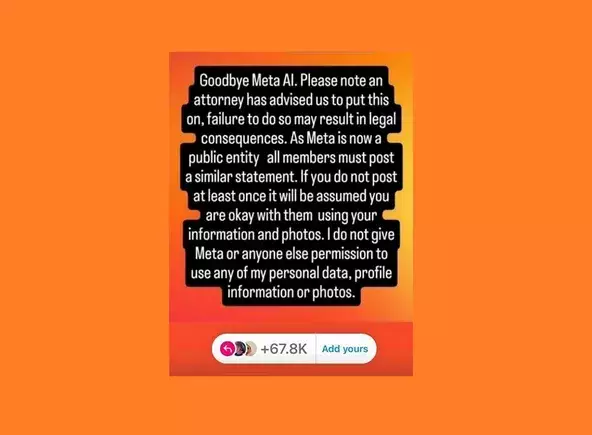In an age where social media is the cornerstone of communication, it’s hard to ignore the wave of misguided sentiments that periodically sweep across platforms. A trending post often leads users to believe they are taking a stand against corporate practices or legal strategies merely through a share or a comment. This phenomenon has repeatedly manifested in claims asserting that posting a message on Instagram or Facebook can somehow serve as a legal objection to corporate policies or practices. The reality, however, is starkly different. Instead of rallying for change, these actions often prove to be futile gestures that mislead individuals about their rights and the power they hold.
The recent uproar surrounding Meta’s use of publicly shared content for training its artificial intelligence systems exemplifies this concern. Users have taken to social media, posting vague declarations intending to safeguard their rights and privacy. The truth is that these proclamations are no more than noise in a vast digital landscape. They hold no legal weight, echoing a sentiment akin to Michael Scott’s infamous declaration of bankruptcy—loud but devoid of substance.
Meta clearly articulates its position concerning user content, stating that by engaging with its platforms, users agree to the terms laid out in the user agreements. This consent includes the allowance for public posts and photos to be used in AI training. In simple terms, users typically inadvertently consent to these policies without giving them further thought, often rushing through the fine print in their eagerness to connect online.
What’s particularly vital here is the distinction between public and private data. Meta assures users that private messages remain untouched by the AI training processes, emphasizing the platform’s commitment to safeguarding personal conversations. This distinction highlights the contrast between genuine concerns for privacy and the misinformed panic that spurs social media campaigns. Engaging in public discourse means forfeiting some level of privacy, a reality digital citizens must face.
Amidst the chaos, European Union (EU) users do possess a unique advantage through the “Right to Object,” allowing them to refuse the use of their public content for AI training. However, this option is not extended globally, leaving many users across different regions without a tangible method to protect their shared content. Thus, the illusions propagated by social media declarations can inadvertently lead individuals to ignore the actual rights they possess based on geographical jurisdictions.
One of the most troubling aspects of this trend lies in how it reflects on users’ intellectual engagement. Social media is designed for brevity, often prioritizing catchphrases and sensationalism over substantive discussion. When complex legal issues are reduced to a single share, the lack of depth can mislead users into oversimplifying intricate matters. In turn, this erodes the quality of public discourse about rights, privacy, and user agreements that should be central to our understanding of technology and its implications.
This form of “engagement theater,” as it has been aptly described, not only fosters ignorance but risks painting users as unwittingly gullible. When celebrities lend their voices to these misleading narratives, they unwittingly contribute to a culture of misinformation, as followers may take such assertions at face value without pursuing factual understanding.
Rather than relying on questionable social media strategies, individuals should immerse themselves in educating about their rights, understanding user agreements, and familiarizing themselves with digital privacy laws. Online platforms offer abundant information regarding legal structures; rather than engaging in futile demonstrations of objection, users should actively seek out knowledge.
Furthermore, as part of a responsible digital citizenship, individuals should advocate for political candidates or organizations that prioritize transparency in tech practices, ensuring their voices are effectively represented in the nuanced discussions surrounding digital rights and privacy.
The surge of naive social media declarations reflects a broader issue of disengagement from the realities of digital life. While the urge to defend one’s rights online is commendable, empty gestures serve only to perpetuate misunderstandings. It is time to prioritize knowledge over rhetoric, encouraging a generation of informed individuals capable of engaging in rigorous dialogues about technology’s role in our lives. Ultimately, true empowerment comes not from sharing a poorly conceived post but from understanding the underlying issues at play.

